6 key investment principles
Kotler Law Firm P.L.
For more information about the author, click to view their website: Siena Wealth Advisory Group
Jul 22, 2023
Florida - Southwest
Email US
Click to Email UsLearn more about these 6 keys to better investing:
- Leverage the power of compound interest
- Use dollar-cost averaging
- Invest for the long term
- Take your risk tolerance level into account
- Benefit from diversification and strategic asset allocation
- Review and rebalance your portfolio regularly
An Ameriprise financial advisor can help you employ and balance these and other investment strategies as you work toward your long-term financial goals and manage short-term market changes.
1. Leverage the power of compound interest
Over time, as your investments earn interest, if you reinvest those earnings, you earn interest on your interest. This is the core idea of compound interest. Without any extra effort on your part, compounding interest and time work together to potentially increase your investment returns.
If you start saving early, you take advantage of the effects of compounding interest on your investments over a long period of time. This has the potential to increase your total returns.
How compounding interest can increase returns
Based on an initial $10,000 investment and 7% annual growth per year*
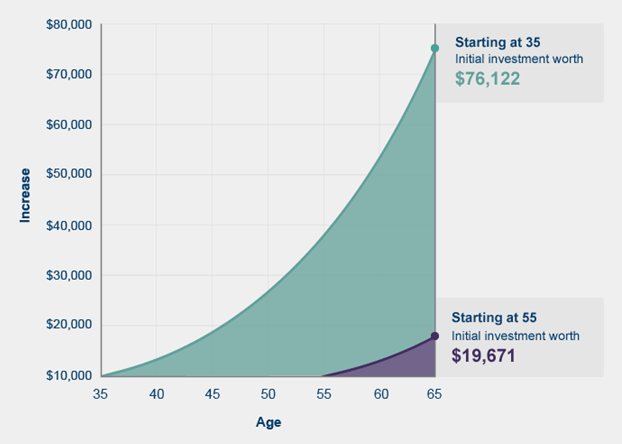
2. Use dollar-cost averaging
Sticking to the discipline of dollar-cost averaging can help you avoid making emotional decisions based on market turbulence. With dollar-cost averaging, you invest a certain amount of money at regular intervals, regardless of what the market is doing. By always investing the same dollar amount every month or other chosen period, you naturally buy fewer shares when the market is high and more shares when the market is low.
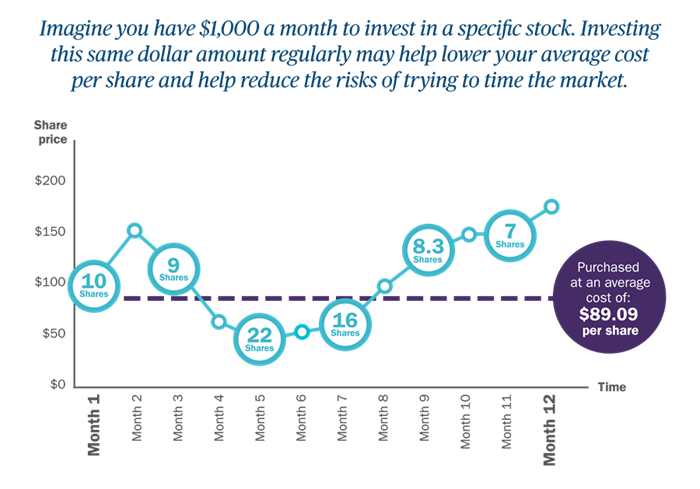
3. Invest for the long term
It may be tempting to try and time the market — buy and sell investments based on what you believe the market is going to do in the future — but you risk losing quite a bit of money, over time. During volatility, the worst days in the market are often closely followed by some very good days. When you take money out of the market on a downturn, you may miss the subsequent upswing and recovery in prices.
Time is on the side of the investor and a buy-and-hold strategy usually produces better results in the long term.
A financial advisor can help you create a personalized investment plan that looks at both inflation and your long-term goals, so you can retire with more confidence.
4. Take your risk tolerance level into account
What are your goals for investing? Are you comfortable losing money if the stock market performs poorly or does any sort of investment loss make you nervous? These are the types of questions to think about and discuss with an advisor to help gauge your tolerance for risk.
Investors with more time to recoup market losses may be more comfortable taking risks. However, as you near retirement or if you’re already retired, you may want to adjust your risk tolerance to make sure your investments are consistent with your goals.
Once you’ve determined how much risk you’re willing to accept and what your investing time frame is, your advisor can help you allocate assets and diversify your portfolio accordingly.
Take the risk tolerance quiz to figure out your own risk tolerance level.
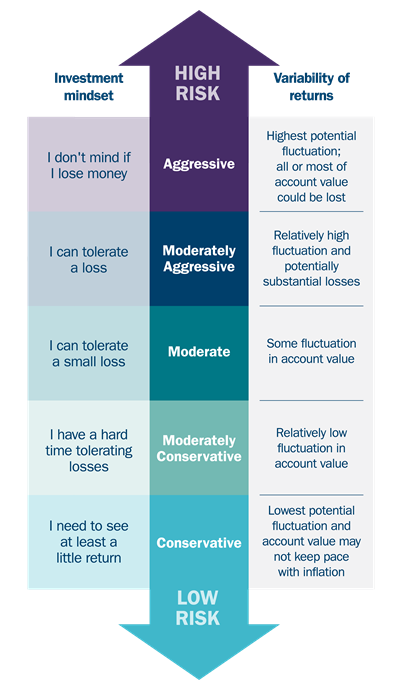
5. Benefit from diversification and strategic asset allocation
Diversification refers to the mix of investments in your portfolio, such as stocks, bonds, alternative investments and cash for the purpose of mitigating risk. By including a variety of investment types, you reduce your dependence on the performance of any single investment. Think of the adage, “Don’t put all your eggs in one basket.”
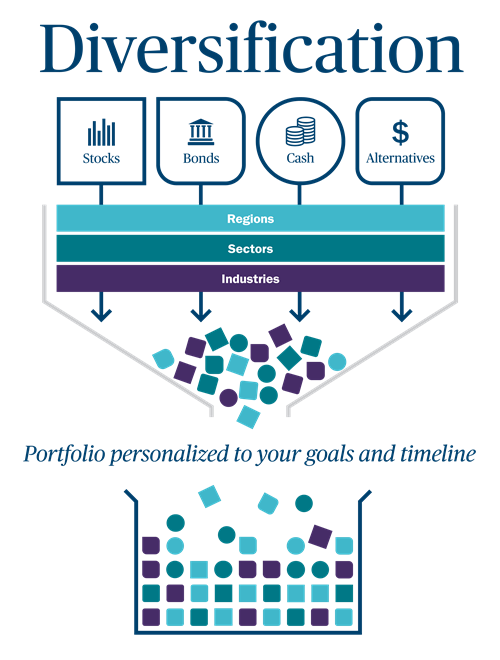
Asset allocation refers to being planful about the amount you invest in each asset class. It is the nature of markets that different asset types react differently to changes in the market — while one class is performing poorly, another is likely doing better. The right asset allocation strategy will factor in your goals, risk tolerance, time horizon and tax sensitivity.
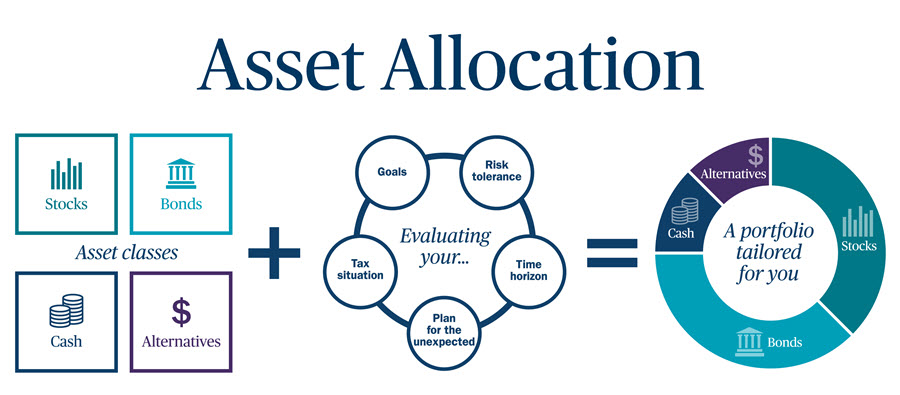
6. Review and rebalance your portfolio regularly
Over time, investments within your portfolio will grow at different paces. As a result, your diversification and asset allocation can become unbalanced. Add in any changes to your income, risk tolerance or family situation, and your investments may no longer reflect your goals. An annual review of your portfolio with your advisor will give you an opportunity to fine-tune and rebalance your portfolio to help you stay on track toward meeting your financial goals.
- To view the original version of this article visit www.ameriprise.com/financial-goals-priorities/investing/six-keys-to-more-successful-investing
- Seniors Blue Book was not involved in the creation of this content.
Other Articles You May Like
Is buying a home always the right move?
Its widely thought that home ownership is a key to building wealth but is it? And should you consistently make sacrifices to buy your own home? Lets start with the first question: Is owning a home essential to building wealth? It would probably be more accurate to say that home ownership can be helpful in building wealth. Building home equity essentially, the difference between the size of your homes value and what you still owe is certainly valuable. Plus, the bigger your equity, the less you might have to take out in a new mortgage if you ever want to buy a different home. Now for the next question: How much should you sacrifice to buy your own home? This isnt an easy question to answer because buying a home isnt just a financial issue its also an emotional one. Many people simply like the feeling of owning a home. If you fall into this category, you might be willing to make many sacrifices to join the ranks of homeowners. However, if youre relatively young and you are part of a single or even a dual-income household, you may well find that your other priorities are more important than home ownership, at least for the moment. These priorities can include paying off student loans, reducing other debts, paying for child care, meeting health care costs and even saving for retirement. With all these expenses, you might not be able to take on a big mortgage, along with real estate taxes, homeowners insurance and the inevitable but costly repairs that come with owning a home. In addition to the danger of becoming house poor by paying too high a percentage of your income on your mortgage, you could face another issue by sinking too much money into your home and thats liquidity. A home is much more illiquid than savings or investment accounts, so if you needed money in a hurry, and most of yours was tied up in your home, you might be in a jam. You could tap into your home equity through a loan or a line of credit, but thats basically taking on even more debt, though these loans and credit lines typically offer lower interest rates than other forms of borrowing. So, heres the bottom line: You dont need to feel that you are missing out on a chance to build wealth by not buying a home immediately especially if you would feel extremely stretched by the mortgage payments, given how expensive homes are today. You wont hurt yourself and, in fact, youll likely help yourself by taking care of your most pressing priorities first. Of course, this doesnt mean that you can never become a homeowner. If you would still like to own a home someday, you could start saving for a down payment, keeping the money in a liquid, low-risk account. Just as importantly, though, you should plan on how owning a home can fit into your budget and how it will affect your cash flow. If you can manage it, you may indeed find that theres no place like home.Chad Choate III, AAMS 828 3rd Avenue West Bradenton, FL 34205 941-462-2445 chad.chaote@edwardjones.com This article was written by Edward Jones for use by your local Edward Jones Financial Advisor. Edward Jones-Member SIPC
How to Pay for Senior Living
Considering senior living as the best option for you or a loved one? If youre just beginning, the search can often feel daunting. And knowing where to look for possible financial resources can seem like a mystery.Its often helpful to approach this as a step-by-step process. Answering the following questions can help get you off to the right start: What lifestyle, amenities and services are you looking for? Is help needed for physical or cognitive issues? If yes, at what level? Which of the 4 basic types of senior living listed below would provide the best fit? What is the cost of senior living? What options may be available to pay for senior living? Basic categories of senior livingFollowing are 4 types of communities available: Independent Living: Private residences for older adults to continue living independently and enjoy the activities, amenities and services offered. Assisted Living: Private residences and assistance with the activities of daily living, such as bathing and dressing. Amenities and other social activities included. Long-Term or Skilled Nursing Care: Full-time care by a trained staff for those requiring medical care for rehabilitation or for long-term chronic conditions. Memory Care: Specialized care for those with Alzheimers or dementia, included as part of assisted living, long-term care or in a stand-alone community. The cost of senior livingPrices vary among communities, services offered and locations. Talk to an associate at a specific community to confirm costs. Be sure to clarify what services are included or can be contracted for an additional fee.How to pay for senior livingEach type of senior living may have varying costs and different payment sources available.When you visit a community, theyll provide you with more detailed information about financial options. We also invite you to download our free guide The Dollars and Sense Guide to Senior Living.The following list offers an overview of a few of the financial resources that may be available, as well as options you might not have yet considered. Private money Personal funds are typically used to pay for independent living, the majority of assisted living and a smaller amount of long-term care. Some states do accept Medicaid for certain assisted living costs.Personal resources could include: Cash Checking and savings accounts Salaries, if youre still working Social Security payments Dividends distributed Investment accounts Retirement or pension plans Long-Term Care Insurance Depending on the policy, long-term insurance may cover the cost of home care, adult day care, assisted living, memory care and long-term care. These policies are sold by private insurance companies and other businesses or as additional insurance offered by employers.The cost of a policy is based on the age of the person at the time of purchase, amount of insurance, time period covered, deductible and any special options. Veterans Benefits Veterans or their surviving spouses may be eligible to receive monthly benefits to help cover the costs of senior living if they meet certain income and personal care qualifications. Known as Aid and Attendance, this federal benefit is offered through The Department of Veteran Affairs. It can help pay for care in the home, assisted living or a long-term care community. Life insurance conversions Your life insurance policy may be transferred to a financial account that provides monthly benefits to help pay for home care, assisted living, long-term care and hospice. These funds wont count as an asset in the Medicaid spend down process, described below. Your home Seniors may have equity built up in their home, which can provide a source of funds. If youre moving into a senior living community, selling your home may provide the money you need.Other financial options that your home may offer include: Access to cash through a home equity loan A line of credit based on your homes equity Reverse mortgage which also considers a homes equity. This funding is only available if one of the owners remains living in the home. Renting out your home. If your home is paid for, the rent received could be applied toward senior living expenses. Medicare Medicare is a federal health insurance program and will only pay for long-term care if you require rehabilitative care at home or in a nursing home, for a limited period of time and if you meet certain restrictions. It doesnt pay for general personal care, assistance with the activities of daily living, or room and board. Medicaid Medicaid will pay for long-term nursing facility care but in order to be eligible, you need to qualify for having limited financial resources. If you do have assets, however, you would need to spend them down in order to qualify. As a joint federal and state program, states may offer some assistance with assisted living costs.Considerations when calculating the cost of senior livingPeople often assume its less expensive to remain at home instead of moving to a community. But that may not be true. Look at the big picture when considering the costs of home vs senior living. If your home would need expensive renovations to make it accessible or if you would need to contract for services to come into your home, the costs may be more comparable than you might have thought.But dont forget to account for the non-financial benefits and advantages. If the safety and quality of life for you or your loved one can be achieved more successfully in a senior living community, youll want to consider the tradeoff of any monetary savings.
Will My Disability Benefits Change When I Turn 65?
Will My Disability Benefits Change When I Turn 65?Turning 65 years old has traditionally been associated with retirement and enrollment in federal benefit programs. However, people with disabilities may already be receiving federal benefits through Social Security, Medicaid, and Medicare before they turn 65.Disabled individuals who qualify for Social Security Disability Insurance (SSDI) and/or Supplemental Security Income (SSI) may wonder what happens to their disability benefits when they reach retirement age.The short answer is that their benefits dont end, and the amount they received prior to turning 65 remains the same. But given the complexity of the federal benefits system, there may be exceptions to these general rules on a case-by-case basis that need to be discussed with a disability attorney.Age 65 and Full Retirement AgeFor most of Social Securitys history, full retirement age, or the age at which someone could receive the maximum amount of Social Security retirement benefits based on their work history, was 65 years old.Reforms to Social Security in the 1980s raised the full-benefit retirement age to between 66 and 67 years old, depending on when somebody was born. For anybody born in 1960 and later, full retirement age is now 67.When Does Social Security Disability Convert to Regular Social Security?The Social Security Administration (SSA) does not permit a person to receive both disability and retirement benefits on one earnings record at the same time.For anyone receiving SSDI payments, their monthly disability benefit automatically switches to Social Security retirement upon reaching full retirement age. Again, this is age 66 or 67 for most people.When this switch takes place, the monthly payment amount stays the same.How Long Do Social Security Disability Benefits Last?SSDI lasts for as long as the recipient has a disabling condition and is unable to work, or until they reach retirement age, at which time the disability benefit converts to a retirement benefit.Social Security performs a continuing disability review (CDR) of SSDI recipients every three to seven years.Turning 65 or reaching full retirement age does not trigger this review. And once SSDI benefits change over to retirement benefits, there is no need for a medical review, since a recipient doesnt have to be disabled to receive Social Security old age benefits.SSI and Retirement AgeA person may qualify for SSI with a disability if they have little or no income and resources and are age 64 and younger, or they have little or no income or resources and are age 65 and older.Qualifying for SSI does not require a work history the way that SSDI does. So, someone can qualify for SSI without ever having worked. But because the SSI benefit payment is not tied to a work history, SSI benefits do not convert to retirement benefits upon reaching full retirement age.If someones receiving SSI for a disability, their benefits can continue after they reach retirement age as long as they still meet the programs financial requirements.Disabled SSI recipients are subject to a CDR at least once every three years, or every five to seven years. During the CDR, the SSA also reviews a recipients income and resources to ensure they are still eligible for and receiving the correct SSI benefit amount.Disability, Medicare, and Turning 65Medicare eligibility ordinarily begins at age 65. But people under age 65 whove gotten SSDI benefits for at least 24 months can start receiving Medicare.SSDI recipients automatically get Medicaid Part A and Part B, collectively known as Original Medicare, after receiving their 25th month of benefits. They can choose at that time to decline or keep Part B, which covers services from doctors and other health care providers. They must typically keep Part A, the portion covering inpatient hospital care.When individuals with qualifying disabilities turn 65 and gain age-based Medicare eligibility, they dont have to re-enroll or complete additional paperwork to continue receiving health care benefits.Turning 65, though, amounts to a secondary initial enrollment period. This could be a good time to re-evaluate current Medicare coverages and make changes.For example, a disabled Medicare recipient may have declined Part B coverage when they first enrolled but decide to keep this coverage when they enroll again at age 65. They can also choose to enroll in another Medicare program, such as Part C or D.Disability, Medicaid, and Turning 65Medicaid is government health care for people with limited income, including those with disabilities.In many states, SSI recipients automatically qualify for Medicaid. Medicaid eligibility thats based on receiving SSI should not be impacted by turning 65, but there could be considerations related to special needs trust funding at age 65.Medicaid covers some costs that Medicare does not, such as long-term care. Special needs trusts can help to preserve a beneficiarys access to benefits like SSI and Medicaid. But the window of time to fund a first-party special needs trust closes at age 65.Some people are also eligible for both Medicaid and Medicare. They may be able to enroll in a Dual Eligible Special Needs Plan, a type of managed care plan that helps to coordinate coverage for those with complex medical needs.Work With a ProfessionalSSDI, SSI, Medicare, and Medicaid all have complex rules that may vary by state. Whether youre turning 65 or reaching retirement age, contact Ashley Day at 251-277-3377. She can provide answers and assist with any necessary paperwork.